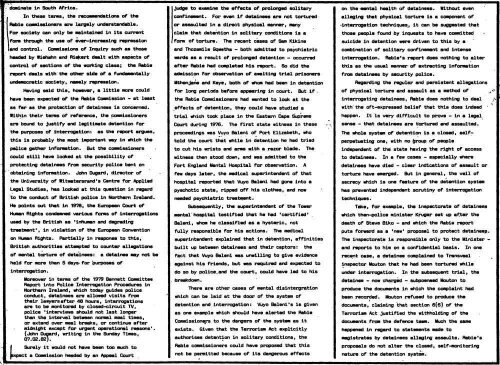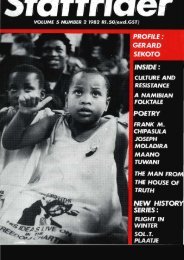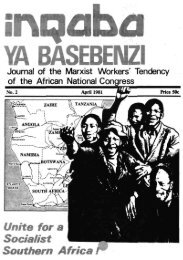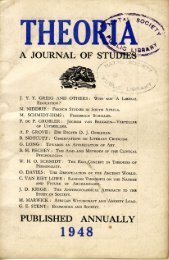You also want an ePaper? Increase the reach of your titles
YUMPU automatically turns print PDFs into web optimized ePapers that Google loves.
dominate In South Africa.<br />
In these terms, the recommendations of the<br />
Rsbls commissioners are largely understandable.<br />
For society con only be maintained in ite current<br />
fom through the us» of ever-increasing repression<br />
end control. Commissions of Inquiry such as those<br />
heeded by wlehmhn end Riaftert dealt with sspects of<br />
control of Motions of the working class; the Rabie<br />
report dials with ths other aids of a funds—ntally<br />
undemocratic society , namely rapreeelon.<br />
Having said this, hoaavar, a littla more could<br />
hava bssn expected of tha fteble Commission - at lsast<br />
as far as tha protection of detainees is concamad.<br />
within their terms of reference, tha commissioners<br />
ara bound to justify and legitimate datsntion for<br />
tha purposes of interrogation: as tha rsport argues.<br />
this is probably tha most important way in which tha<br />
pellca gather information. But tha coaalsalonars<br />
could still hava looked at tha possibility of<br />
protecting dstalnees from security police bent on<br />
obtaining lnforeatlon. John Ougerd, director of<br />
tha University of Wlteatarsrond's Centre for Applied<br />
Legal Studies, hea looked et this question in regard<br />
to the conduct of British police in northern Ireland.<br />
He point* out that in 1978, the European Court of<br />
Huasn Rights condeaned various fores of interrogations<br />
used by the British es 'inhuman end degrading<br />
treetsant', in violation of the European Convention<br />
on Husan nights. Partially in response to this,<br />
British authorities atteapted to counter allegations<br />
of aantal tortur* of dete'inees: a detainee may not be<br />
held for sore than 5 days for purposes of<br />
lnterroget ion.<br />
Moreover in teres of the 1979 Bennett Coesittee<br />
Report into Police Interrogation Procedures in<br />
Northern Ireland, ehich today guides police<br />
conduct, detainees are allowed vleits from<br />
their leeyersefter 48 hours, interrogations<br />
era to be aonitored by closed-circuit TV,<br />
police "interviews should not lest longer<br />
then the interval between noioal seal times,<br />
or extend over eaal breaks, or continue after<br />
aldnlght except for urgent operational reasons'.<br />
(John Ougard, writing in the Sunday Tlese,<br />
07.02.8ZJ.<br />
f Surely it would not heve been too such to<br />
bxpect a Commission heeded by an Appeal Court<br />
Judge to exealne the effects of prolonged solitary<br />
confinement. For even If detslnees are not tortured<br />
or eaaaulted In a direct physical earner, aeny<br />
claim that detention in solitary conditions la a<br />
form of torture. The recent ceeee of Sea Kikins<br />
and Thoznmile Gqesthe - both admitted to psychiatric<br />
wards ss s result of prolonged detention - occurred<br />
efter Rabie had completed hie report. So did the<br />
adeisslon for observation of awaiting trial prlsonara<br />
Mthenjene end Keye, both of whoa had been in detention<br />
for long periods before appearing In court. But if .<br />
the Rabie Coasissloners had wanted to look at the<br />
effects of detention, they could heve studied a<br />
trial which took piece in tha Eastern Cape Supreme<br />
Court during 1976. The first state witnsss in thtsw<br />
proceedings wes Vuyo Bsleni of Port Elizabeth, who<br />
told the court thet while in detention he hed tried<br />
to cut his wrists end area with e razor blede. The<br />
witness then stood down, end ess adaltted to the<br />
Fort Englend Hental Hospital for observetlon. A<br />
few days later, tha eedlcal superintendent of that<br />
hospital reported thet Vuyo Beleni had gone Into e<br />
pyechotic state, ripped off hie clothes, snd now<br />
needed peychletrio treatment.<br />
Ouboequently, the ouperintendent of the Tower<br />
•ante! hospital testified that ha had 'certified* .<br />
Beleni, whoa ha classified as a hysteric, not<br />
fully rasponslbls for his actions. The aadlcel<br />
superintendent explained that in detention, effinitios<br />
built up beteeen detainees and their captors: the<br />
fact that Vuyo Bsleni was unwilling to give evidenoe<br />
•gainst his friends, but waa required end expected to<br />
do eo by police.and the court, could heve led to his<br />
breekdawn.<br />
There ere other esses of eental disintegration<br />
which can bs laid at tha door of the systsa of<br />
detention and interrogation: Vuyo Bslenl*s ie given<br />
es one example which should heve alerted tha Rabie<br />
Commissioners to the dangers of the system es it<br />
exists. Given that tha Terrorism Act explicitly<br />
authorises detention in solitary conditions, the<br />
Reble commissioners could have proposed thet this<br />
not bs permitted becauss of its dengerous effects<br />
on the aantal health of detelnses. Without even<br />
alleging thet physical torture Is s component of<br />
'interrogation techniques, it can be suggested that<br />
those people found by inquests to have committed<br />
suicide in detention were driven to this by e<br />
combination of solitsry confinement end Intense<br />
interrogation. fteble*e report does nothing to alter<br />
this ss the usual manner of extracting information<br />
from detainees by security police.<br />
Regarding the regular end persistent sllsgetions<br />
of physical torture and assault es e method of d<br />
intarrogating detainees, Rabie does nothing to deel<br />
with the oft-expressed belief thet thie doee indeed<br />
happen. It ie vary difficult to prove - In e legal<br />
sense - that detainees era torturwd and aesaulted.<br />
The whole system of detention is e closed, self-*<br />
perpetuating one, with no group of people<br />
Independent of tha state having the right of access<br />
to detainees. In e few cases - especially where<br />
detainees heve died - clear indications of easeult or<br />
torture have emerged. But in general, the veil of<br />
secrecy which Is one feature of tha detention system<br />
has prevented Independent scrutiny of Interrogation<br />
techniques.<br />
Tekw, for example, tha Inspectorate of detelnees<br />
which then-police minister Kruger met up af tar the<br />
death of Steve Biko - end which tha Rabie report<br />
pute forward ea a *nae* proposal to protect detelnees.<br />
The inspectorate is responsible only to the Minister -<br />
end reports to hie on a confidential basis. In one<br />
recant case, e detainee complained to Transvaal<br />
Inspector teuton that he had bean tortured while<br />
under interrogation. In the subsequent trial, tha<br />
detelnee * now charged - subpoenaed Houton to<br />
produce the documents in which the complaint had<br />
been recorded, wbuton refused to produce the<br />
documents, claiming that eectlon 6(6) of the<br />
Terrorism Act Justified the withholding of tha<br />
documents from the defence teem. Huch the same<br />
happened in regard to statements wade to<br />
magistrates by detainees alleging aeaaulta. fteble'e<br />
proposals do not alter the cloead, eelf monitoring<br />
nature of the detention system.

















